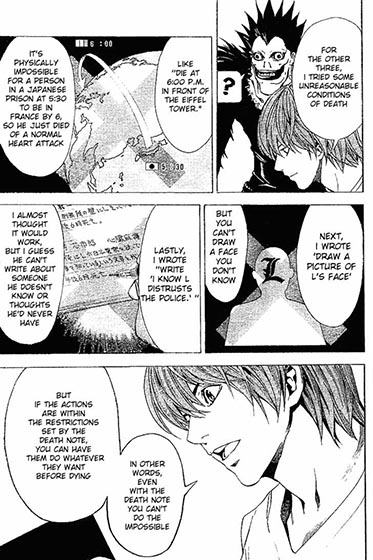There is something very specific about the Prince of Persia movie that bugged me. It actually fits well to the recent Experience Points Podcast where I was the guest. Or more precisely, the GDC talk by Chris Hecker on Finishing Games.
Prince of Persia is a story that centers (or should center) around a supernatural artifact. The prince obtains a dagger that can rewind time for a few moments. However, as I already mentioned the device is not used very often in the movie. But even when they use it, the characters never try to exploit the power this artifact gives them. The dagger is mostly used in the way it’s “intended” to be used. The blurry fringes of the rules that govern it’s power are never explored.
To understand what I mean by that, we need to take a look at a different piece of fiction where characters actually do exploit a supernatural artifact. Let’s talk Deathnote.
Deathnote is a Manga and an Anime where a teenage protagonist obtains a magical notebook. Every time he writes a name in that notebook, that person will die of a heart attack shortly after. The notebook’s owner can even specify a custom death cause and death circumstances by writing them in the notebook as well.
When I first heard that story, I was wondering what kind of drama would unfold around such an artifact. The notebooks seems so tremendously powerful that it’s owner shouldn’t encounter any adversaries or difficulties. So when I read the Manga, it pretty much blew me away. The story depicts a sort of a duel between the protagonist and a very smart super-detective. Even though the protagonist can kill people without leaving any evidence, simply the choice of his victims is enough for the detective to find out a lot about the murderer. Things get even more dramatic later on where the detective stages various traps and tests to determine the murderer’s identity. It’s a magnificent and well-thought out demonstration of deduction skills and logical thinking.
I’m mentioning this because the protagonist in Deathnote has a very peculiar way of dealing with the notebook. Instead of using it as it is “intended”, he actually does a lot of experiments with the notebook’s powers. One of the early experiment is writing the cause of death first and filling in the names later. Later he also experiments with “impossible” death circumstances or with the level of control he has over the way the victims die. He ends up even tearing pages or individual paper strips from the notebook so he can use them more inconspicuously. The very simple rules of how to use the notebook become a fascinating playground for the most macabre experiments. It’s a magnificent example of the author not being afraid of eventual inconsistencies of his own supernatural rules. On the contrary, he uses and explores them to their full potential and creates a surprising, smart and thrilling plot in the process.

I have the impression that especially western authors are afraid to go that far. Prince of Persia is an example. There are a lot in paradoxes the dagger’s powers could create. In one scene the prince gives the dagger to one of his brothers. The brother uses the dagger’s power to rewind to a time where he didn’t have the dagger yet. Weird enough, when time started flow normally again, he was holding the dagger in his hand, not the prince. So he not only used the dagger’s power to rewind time, he also magically transported the dagger from the prince’s hands to his own. What if he would rewind to a time when he was holding something else? What if he would rewind to a time when the prince using the dagger to rewind time? Or how about rewinding to a time when the dagger was used to stab somebody in order to prevent the stabbing simply by the act of rewinding? There are many other ways this could go. My point is that the movie never explored those questions, which is a pity.
Apart from being an exciting way to surprise and challenge the audience, doing such supernatural exploits also has an underlying message. It presents characters who do not simply obey rules and laws, even if they are of supernatural origin. It presents characters who take matters into their own hands, who use their brain and shape their own destiny, even when it means to defy gods. This moral is in line with the most fundamental change in storytelling of the last 2000 years. It’s time we stop going back to old fairy-tales and start thinking things trough. I’m looking at you, LOST! >:(






Your post made me watch the Deathnote anime and I’m very grateful for this. Truly a bold and fascinating exploration of ideas that seem ridiculous at first. Inspiring.
I’m glad you like it! ^_^
Hi Gamedesignreviews,
Very interesting, The unseen and unfelt powers of ghosts and supernatural objects have been talked about for ages. The perplexity of their existence has been doubted for ages, and the people seemed to believe the folklore that has been told by their ancestors.
Thx.